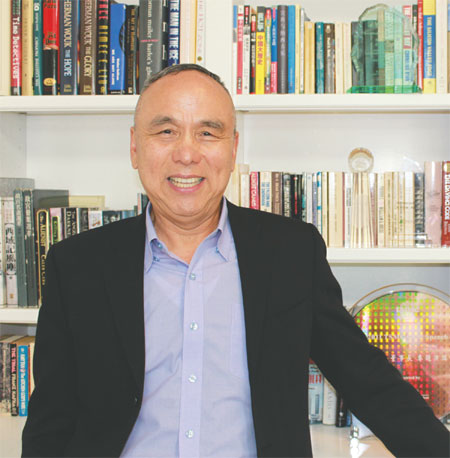Bob Lin: Aims to educate about being an 'angel'
|
Bob Lin at his home in California. Qidong Zhang / China Daily |
He has been a guitarist and singer in a rock band, an inspirational public speaker, an activist in non-profit organizations, a legendary angel fund investor who has brought dozens of startups to IPO status during his 30-year career and a writer.
But along the way, it was the time he spent establishing the rock band and his popularity among girls that led to his first failure and what he said was a disappointment to him and his family: He didn't get into an Ivy League school.
Nevertheless, it didn't stop Bob Lin from becoming a successful angel investor, whose life's experiences and expertise about investing he has captured in his five books that have been top sellers in Asia, with number six-Angel Investment - to be published by China Development Press, one of the most prestigious Chinese publishers in Beijing. The company has made Lin's latest book its "flagship" to promote innovation in China.
"From Google to Apple, angel investment has brought innovation to the global economy and has changed everybody's life," said Bao Zhengyue, president of China Development Publishing, which is under the State Council Development Research Center.
"The author of Angel Investment is one of the first Chinese-American angel investors and has rendered over 30 years of his experience in his book. The stories of his success and failure will help Chinese readers understand and hopefully duplicate angel investment in China."
Lin shares those life experiences in his five other books: Find Your Way To Success & Happiness (2003), Creating Value to Differentiate (2004), Build Your Career From Where You Are( 2005), It So Easy to be Super Happy (2007), and Family Education of the Successful People(2011).
Lin said his latest book originated from talking to his readers and friends in China and elsewhere in Asia who asked a range of questions about angel investing."The purpose of my book is to help readers understand the nature of angel investment, the fun and great risk, and most of all, help duplicate the Silicon Valley angel-investment culture in China and Asia," he said.
"Angel Investment is actually like the experience of having a daughter. The early investment is helping nurture the baby before she is even born with nutrition and vitamins to make sure she is born healthy. We then accompany her to grow up, receive education, introduce her to society, and later prepare her for starting a family and extending her relationship with her own family," said Lin.
One of the youngest four children born in Taipei, Taiwan, Lin was a gold medalist in piano competition at age 5 and a good student at school. But then came the rock band, the girls and not going to an Ivy League school.
"It was the first time I experienced failure, which was actually a good life lesson to learn at an earlier age, better early than later,"said Lin.
Lin's angel investing started in1976 when he was a graduate student at University of California in Santa Barbara.
"My family told me that my cousin had invested in a high-tech firm named 'Tonix' in Silicon Valley. I knew nothing about angel investing, but encouraged my parents to invest in it. It was a laughable venture by today's standard, but that was where I learned my first lesson: angel investment is all about value. If you have value, you are in for the ride, if you offer no value, you are off the board,"he said.
A long list of investment ventures followed, including Galaxy, Ampi, Lion Plaza, Avanti, Altigen, Vertex Network, Light Logic, Monday Tech, Greatland Electronic, Pine Photonics, Winning Soft, Acorn Venture and Acorn Campus.
In 1996, Lin and five friends - Wu-Fu Chen, David Tsang, T Chester Wang, Mike Tsai and Gilbert Hu - established Acorn Venture, which became the cradle of Acorn Campus, the well-known incubator formed by Chen, Tsang, Wang and Lin three years later. It successfully invested in dozens of startups with approximately $100 million in capital.
While he has had success, he also has experienced the lows of angel investing. In the early 2000s, the dot-com crash sank some of his biggest investments, such as in fiber optics with Bandwidth 9, Optical Market Machine. Their market value soared to more than $1 billion and dropped to less than zero.
"Sometimes we (investors) talk about these failures, but have a lot of respect for those entrepreneurs who dared to make a difference in the technology that helps humanity, and I admire what Reid Hoffman - a legendary venture capitalist who invested in Facebook, Zynga, Friendster - once said: 'All entrepreneurs should be prepared to die and revive from death,'" said Lin.
Of all his hundreds angel investments, Lin said he is most proud of Healthlink, which was established in China. Headquartered in Beijing, it is now the country's largest emergency-assistance or medical-assistance network for people who encounter emergency medical problems when traveling.
"We already have millions of members and serviced the 2008 Olympic Game in Beijing, the 2009 Shanghai World Expo, and the 2010 Guangzhou Asia Games, coordinating with all 120 emergency-call networks in China. Every day when you open your eyes, Healthlink was trying to save people's lives, whether it's somebody falling down when climbing the Great Wall, or getting sick when traveling in remote areas in China. It takes one phone call to send you to hospital, insurance covered."
To educate the general public about the true nature of angel investing and in the hope of duplicating in China Silicon Valley's success, 18 of Lin's friends formed SVT Angel Group in 2013.
The nonprofit organization will initiate innovation competition in China and Silicon Valley, help select entrepreneurial teams, present awards and nurture them to success, "just like old hens teaching young chicks side-by-side," said Lin.
Kellyzhang@chinadailyusa.com



















